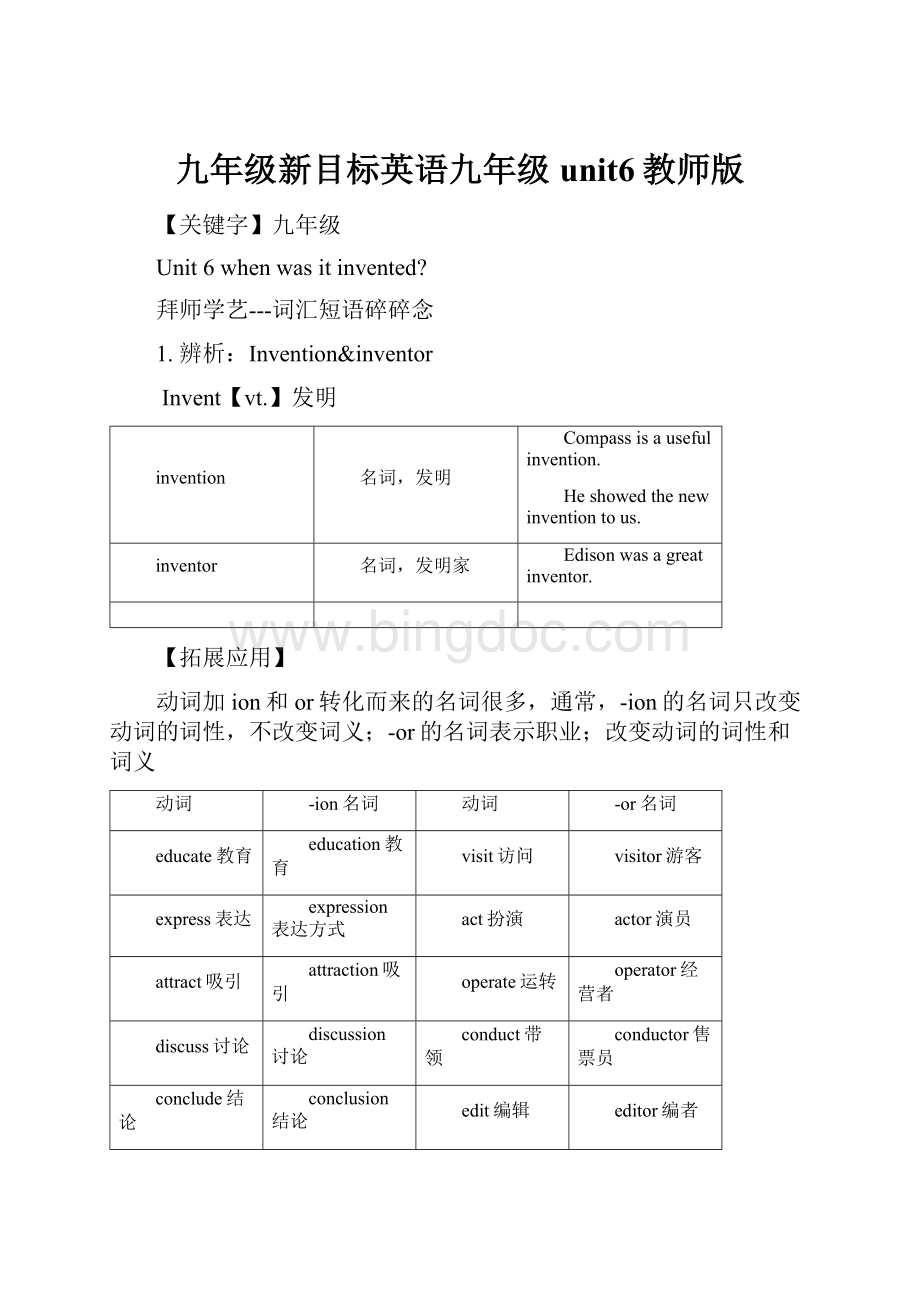九年级新目标英语九年级unit6教师版.docx
《九年级新目标英语九年级unit6教师版.docx》由会员分享,可在线阅读,更多相关《九年级新目标英语九年级unit6教师版.docx(20页珍藏版)》请在冰点文库上搜索。

九年级新目标英语九年级unit6教师版
【关键字】九年级
Unit6whenwasitinvented?
拜师学艺---词汇短语碎碎念
1.辨析:
Invention&inventor
Invent【vt.】发明
invention
名词,发明
Compassisausefulinvention.
Heshowedthenewinventiontous.
inventor
名词,发明家
Edisonwasagreatinventor.
【拓展应用】
动词加ion和or转化而来的名词很多,通常,-ion的名词只改变动词的词性,不改变词义;-or的名词表示职业;改变动词的词性和词义
动词
-ion名词
动词
-or名词
educate教育
education教育
visit访问
visitor游客
express表达
expression表达方式
act扮演
actor演员
attract吸引
attraction吸引
operate运转
operator经营者
discuss讨论
discussion讨论
conduct带领
conductor售票员
conclude结论
conclusion结论
edit编辑
editor编者
devote奉献
devotion奉献
translate翻译
translator译者
2.With【prep.】后面常接代词,名词或动名词
“有;带有;具有”
acoatwithfourpockets
abookwithabluecover
“和……在一起”,表伴随
Ifeellikegoingforawalkwithmymomnow.
“用……”,表示使用某种工具、手段等
Openthedoorwiththekey.
小试牛刀:
——Wouldyoulikesomecoffee,please?
——Yes,andpleasegetsomesugar.Iprefercoffee_____sugar.
A.toB.forC.withD.from
3.辨析such&so
such
adj.
后接名词或名词短语
①such(a/an)+adj+n.
②some/any/no...+such+n.
①Ihavenevermetsuchabeautifulplacebefore.
②I’msorrythatIhavenosuchbooks.
so
adv.
后接形容词或副词
1.so+adj./adv&so+adj.+a/an+n.
2.Somany/much/few/little+n.
1.Myfatherboughtmesolovelyadog.
2.Hehassomanybooksinhisroom.
注意:
相互转化
so+adj./adv&so+adj.+a/an+n.such(a/an)+adj+n.
eg:
Ihaveneverreadsointerestingabook.==Ihaveneverreadsuchaninterestingbook.
助记
such,so用法活,实际运用规则多。
名词前such,形、副so,多多少少也用so。
Little属于特殊词,“小”用such,“少”用so。
小试牛刀:
—Whydoyouspeakin____aloudvoice?
—BecauseIwanttomakemyself___clearly.
A.such;hearB.so;heardC.such;heardD.so;hear
4.辨析:
please,pleasure,pleased,与pleasant
please
v.
及物动词
表示“使高兴、满意、愉快”
Thegoodnewspleasedher.
Hedoeswhateverhepleases.
不及物动词
随(某人)喜欢
pleasant
adj.
做定语
令人高兴的,只修饰物
Ihopeyouhaveapleasanttrip.
做表语
使人感到高兴的,句子的主语是表示事物的词语
Itispleasanttomeetyou.
pleasure
n.
表示“愉快,高兴”,多用于口语
It’smypleasure./Withmypleasure
pleased
adj
做定语
高兴的,喜欢的
句子主语是“人”
Shelookedatme
withapleasedexpression.
做表语
I’mpleasedwiththescores.
5.fall【vi.】表示“掉落,落下”
fall
intobehinddownoffasleep
“掉入,陷入”“落后”“摔倒”“掉下”“入睡”
6.辨析:
nearly&almost
nearly
常用于具体数字前,可与not连用,构成“notnearly”,表示“远非”;可与all,every等词连用
Theriverisnearly100meterswide.
NearlyallofthemliveinEngland.
almost
相当于verynearly,可与no,nothing,none,never等词连用,但通常不与not连用,不能说notalmost或almostnot,表示“几乎不”用hardly;在morethan,too前用almost
Almostnoonebelievedhim.
Thisisalmostmorethanwefeared.
7.thousand【num.】“千”
表示“几千”时用“基数词+thousand”;如果thousand前为表示不确切数目的词,如afew,some,several等时;thousand也用原形。
e.g.Therearetwo/severalthousandstudentshere.
【拓展】
thousandsof表示“数百;成百上千的”,这时thousand后面“s”,且后面有介词of,但是不能与数词连用。
arethousandsofpeopleinthecompany.
与thousand用法类似的词还有:
hundred“百”,million“百万”,billion“十亿”。
它们可以用来表示约数或准数。
小试牛刀:
TheearthquakeinYa’anleft____peoplehomeless.
A.twothousandsB.thousandsofC.twothousandsofD.twothousandof
8.lessthan表示“少于”
morethan表示“多于”
9.nation【n.】表示“国家;民族”
e.g.IamproudoflivingintheChinesenation.
【拓展】
national【adj.】表示“国家的;民族的”。
是由名词nation+后缀al构成的
roseisthenationalflowerofEngland.
concertbeganwiththenationalanthem.
10.popularity【n.】表示“受欢迎;普及”
常用短语:
thepopularityof---意为“---的普及”
popularityoftheInternethasrisen.
11.doubt【n.】表示“疑惑,疑问”
常用短语:
withoutdoubt,意为“毫无疑问;的确”。
E.g.Asuddendoubtcametomymind.
E.g.HeisnodoubttheclevereststudentIhaveevertaught.
【拓展运用】
doubt[v.]表示“怀疑”。
可接名词,代词或者“疑问词+动词不定式”作宾语
E.g.HedoubtedJim,sincehewaseverdishonest.
12.low【adj.】,表示“低的;矮的”。
对应的反义词为high
sunislowintheskynow.
【拓展应用】
①Low做形容词时,还可以表示“不高兴的,情绪低落的”
E.g.Sheisstillfeelingprettylowaboutfailingintheexam.
②atalowprice意为“以低价”。
At为介词,后接一具体价格或price,表示“以----的价格”
E.g.Iboughtthiswatchatalowprice.
13.translate【vt.】表示“翻译”
Translate---into---表示“把---翻译成---”
E.g.Theytranslatedhisbooksintoseveralseverallanguages.
14.lock【vt.】表示“锁;锁上”。
E.g.Don’tforgettolockthedoorbeforeyouleave.
【拓展应用】
Lock[n.],表示“锁”
E.g.Thisisthekeytothelock.
15.allofasudden表示“突然”
E.g.Allofasudden,thelightswentout.
E.g.Theboybegancryingallofasudden.
【拓展】
Suddenly[adv],意为“突然”
Afterafewminutes,Tomsuddenlycamebacktolife.
16.辨析:
sometime,sometimes,sometimes与sometime
sometime
名词短语
一段时间
表示“一段时间”等,常常与延续性动词连用,对它提问用howlong
sometimes
频度副词
有时
表示动作发生的不经常性,多与一般现在时连用,它可用于句首,句中或句末
sometimes
名词短语
几次;几倍
其中time是可数名词,对它提问用howmanytimes
sometime
副词
某时
表示某个不确定或不具体的时间,常用于过去式或将来时,对它提问用when
助记:
sometime,sometimes,sometimes与sometime的用法
分开“一段时间”(sometime),相聚“某个时候”(sometime)
分开s是“倍;次”(sometimes),相聚s是“有时”(sometimes)
小试牛刀:
用以上词语的恰当形式填空:
1.Ineed______todomyhomework.
2.Shecomestovisitus______.
3.LucyhasbeentoBeijing_____.
4.JackwillleaveforAmerica______nextweek.
摩拳擦掌---课文句子萌萌哒
1.Potatochipswereinventedbymistake.薯条是无意中被发明的。
bymistake.介词短语,“无意中,错误地”
【拓展】
makeamistake/makemistakes犯错误,
E.g.Itookyourpenbymistake.
E.g.Don’tmakemistakesanymore.
mistake---for---把---错当成---
E.g.ImistookLilyforLucyyesterday.
2.Thecustomerwashappyintheend.最后顾客高兴了。
Intheend意为“最后,最终”,相当于atlast,finally,其后不接of短语
E.g.Theywereoutofdangerintheend.
becamesuccessfulintheendthroughhisownefforts.
【拓展】
①attheendof---后接地点名词,表示在---的尽头;后接表示时间的名词时,表示“在---结束时”。
Walkalongthestreetandyouwon’tmissthehospitalattheendofthestreet.
We’llhaveanEnglishquizattheendofthisweek.
②bytheendof---意为“在---以前,到---为止”(常用于完成时态连用,可以是将来完成时,现在完成时或过去完成时。
E.g.Wewillhavefinishedtheworkbytheendofthisyear.
小试牛刀:
_____ofthisyear,500morecomputerswillbebroughtintotheprimaryschool.
A.AttheendB.IntheendC.Bytheend
3.Itisover100yearsandisplayedbymorethan100millionpeopleinover200countries.篮球运动有100多年的历史了,有200多个国家的一亿多人打篮球。
Over是介词,意为“多于;超过”,相当于morethan,说明数目和程度。
E.g.Thereareover/morethanfourhundredstudentsinourschool.
【拓展应用】
①表示“在---之上”,垂直且不接触,反义词under
E.g.Thelightisoverthetable.
②表示:
“在---期间;在---时间内”
E.g.Ihavedonesomeinterestingthingsoverthepastthreeyears.
③表示“到处;各处”
E.g.We’lltravelallovertheworld.
小试牛刀:
Look!
Thereisabridge____overtheriver..
A.underB.onC.over
4.Atthesametime,theyneedtostopthecompetingteamfromgettingtheballintotheirownbasket同时,他们需要阻止对方把球投到他们自己的篮筐里。
atthesametime意为“同时”,其中same为形容词,意为“相同的”,使用时前面一般要加上定冠词the,后跟单数可数名词或不可数名词
E.g.Webothgottoschoolatthesametimethismorning.
stop---fromdoing---意为“阻止---做---”。
E.g.Theworkershadtoworkforhourstostoptheshipfromgoingdown.
5.Thenumberofforeignplayers,includingChineseplayers,intheNBAhasincresed.在NBA的外国运动员包括中国的运动员的数量已经增长了。
Including【prep.】,意为“包括,包含”。
E.g.Theyhavemanypets,includingthreecats.
E.g.WeallwenttoShanghai,includingmyyoungerbrother.
【拓展应用】
Include[v.],意为“包括,包含”
Theplanincludesmostofyoursuggestions.
Theuniversityincludestencolleges.
6.Manyyoungpeoplelookuptothebasketballheroesandwanttobecomelikethem.许多年轻人钦佩这些篮球英雄,并且想成为像他们一样的人。
①lookupto意为“钦佩;仰慕”
E.g.Theylookuptohimforhisrichknowledge.
【拓展应用】
①仰起头看---
E.g.Thegirlissoshortthatshehastolookuptohereldersister.
②将---尊为(榜样等)
lookuptohimasahero.
②hero【cn.】,意为“英雄”,其复数形式为heroes
注意
以o结尾的名词的复数形式,有的加-s,有的加-es。
常用的有:
①加-s的:
②加-es的:
hero--→heroes,potato--→potatoes,tomato--→tomatoes,可用歌诀“英雄爱吃土豆和西红柿”来记。
7.Thesestarsencourageyoungpeopletoworkhardtoachievetheirdreams.这些明星激励着年轻人为实现他们的梦想而学习。
①encouragesb.todosth.意为“鼓励某人做某事”。
E.g.Theteacheroftenencouragesustostudyhard.
【拓展应用】
①encouragesb.insth.意为“在---方面助长某人的某种行文/鼓励某人”。
encouragehiminlaziness.
②encouragement【cn.】,意为“鼓励;鼓舞”。
teacher’swordswereagreatencouragementtohim.
小试牛刀
Jessica’sparentsalwaysencourageher____outheropinions.
A.speakB.speakingC.tospeak
②toachievetheirdreams是不定式短语,作workhard的目的状语,意为“为了实现他们的梦想”。
动词不定式作目的状语,通常意为“为了---”
E.g.Shegotupearlytocatchtheearlybus.
小试牛刀
Vocabularyisimportanttolanguagelearning.Therefore,you‘dbettertrydifferentwaysyoucanthinkof____wordsandexpressions.
A.rememberB.torememberC.remembering
融会贯通---重点语法过过手
★一般过去式的被动语态
❶英语有两种语态:
主动语态和被动语态。
主动语态表示主语是动作的执行者,而被动语态则表示主语是动作的承受者。
如:
SomeonestolemyQQnumber.(主动语态)有人盗了我的QQ账号。
MyQQnumberwasstolenbysomeone.(被动语态)我的QQ账号被人盗了。
❷一般过去时被动语态的构成和用法
3大核心句式
★一般过去式(被动语态)
①肯定句构成公式
主语+was/were+动词的过去分词+(by---)
例句展示
Treeswereplantedbythemlastspring.
②否定句构成公式
主语+was/were+not+动词的过去分词+(by---)
例句展示
Treeswerenotplantedbythemlastspring.
③一般疑问句构成公式
was/were+主语+动词的过去分词+(by---)
例句展示
Weretreesplantedbythemlastspring?
用法小结
一.不知道谁是动作的执行者,或没有必要指出谁是动作的执行者。
e.g.Englishisspokenallovertheworld.
二.需要突出或强调动作的承受者。
e.g.Thisdictionaryisusedbymoststudents.
❸主动语态变被动语态应注意的问题
1.有些短语动词相当于及物动词,变为被动句时介词或副词不能去掉。
Theyputoffthemeetingbecauseoftheweather.
Themeetingwasputoffbecauseoftheweather.
会议因天气的缘故被推迟了。
2.含有双宾语的主动句变为被动句时,通常把指“人”的间接宾语变为主语,指“物”的直接宾语保留不变;如果把指物”的直接宾语变为主语,则在间接宾语前加to或for。
Myauntgavemeane-dictionaryyesterday.
Iwasgivenane-dictionaryyesterday.
Ane-dictionarywasgiventomeyesterday.
3.主动句中感官动词see/hear/watch/feel等和使役动词make/let/have等后跟省略to
的动词不定式,变为被动语态时应加上不定式符号to。
Isawaheavymanenterthehouse.
Aheavymanwasseentoenterthehouse.
4.系动词、不及物动词或某些短语动词(happen,takeplace,cometrue,fallasleep…)没有被动语态。
WhathappenedtoMr.Brown?
布朗先生发生了什么事?
小试牛刀:
将下列句子变为被动语态。
1.Hechosesixstorybookstheotherday.
Sixstorybooks____________byhimtheotherday.
2.UncleLeegaveJackalargecakeforhepaintedthewallwonderfully.